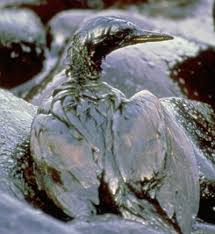 Yesterday was the 20th Anniversary of America’s worst oil spill, the Exxon Valdez.
Yesterday was the 20th Anniversary of America’s worst oil spill, the Exxon Valdez.
It may be twenty years but the scars of the disaster are still being felt today. Take a quick glance at Prince William Sound and you would be forgiven into thinking everything is alright. But you would be wrong.
Scratch underneath the surface and oil can be found – Look at the local wildlife or fish stocks and many have not recovered. Talk to local residents and the spill still casts a dark shadow. Yes it is twenty years, but for some it is like the horrror was only yesterday. And the spill continues to kill their dreams and hopes of tomorrow.
It was on the 24 March 1989, that the Exxon Valdez spilled between 11 and 38 million gallons of crude oil into the fishing waters of Prince William Sound. The spill contaminated more than 1,200 miles of Alaska’s shoreline, killed hundreds of thousands of seabirds and marine animals.
To mark the Anniversary, The Exxon Valdez Oil Spill Trustee Council has published an update report on the state of the wilddlife and communities. It found that: “One of the most stunning revelations of Trustee Council-funded monitoring over the last ten years is that Exxon Valdez oil persists in the environment and, in places, is nearly as toxic as it was the first few weeks after the spill.”
Several species have not recovered. There are two species that continue to be listed as “not recovered,” – Pacific Herring and Pigeon Guillemots, ten species listed as still “recovering”, five listed as “unknown,” and ten listed as “recovered.”
Sea otters and killer whales are both a cause for concern. The Council notes for one of the local whale pods: “ there appears to be no hope for recovery. There has not been a successful recruitment to the pod since prior to the spill. This unique population will likely become extinct as the remaining members continue to age and die..”
The report says “at the slow break down rates, the remaining oil will take decades and possibly centuries to disappear entirely”.
The spill and the effects of the lingering oil in the ecosystem, “continue to affect the social fabric of native villages and communities throughout the affected area. Subsistence gathering in some intertidal areas has never resumed and commercial herring fisheries remain disrupted.”
One of the people who has fought more than most for justice for the people of Alaska over the spill is marine toxicologist Riki Ott, whose most recent book is called Not One Drop: Betrayal and Courage in the Wake of the Exxon Valdez Spill. Ott’s twenty year struggle against Exxon and the oil companies has led her to question the human and ecological harm of society’s dependence on petroleum.
She dispairs at the thought that. as Alaska slowly heals, the oil industry is now destroying Alberta in its quest to continue our hydrocarbon age at any cost.
Speaking on Democracy Now Ott says: “ I think tar sands projects should be shut down. There should be a moratorium worldwide. This is way too energy-intensive. It’s taking water. I mean, come on, water’s got to be more valuable than oil. We’re squandering our gas and our water to get out this sticky substance that emits tons more, three times as much, greenhouse gases than conventional crude… This whole Alberta tar sands is nonsense.”

More birds and wildlife will be saved when the Oil Company’s & Goverment start using products that are Environment Friendly and can do a better job of cleaning up as they hold on to the Absorbed oil and not let it leach back out and that is much safer for our environment